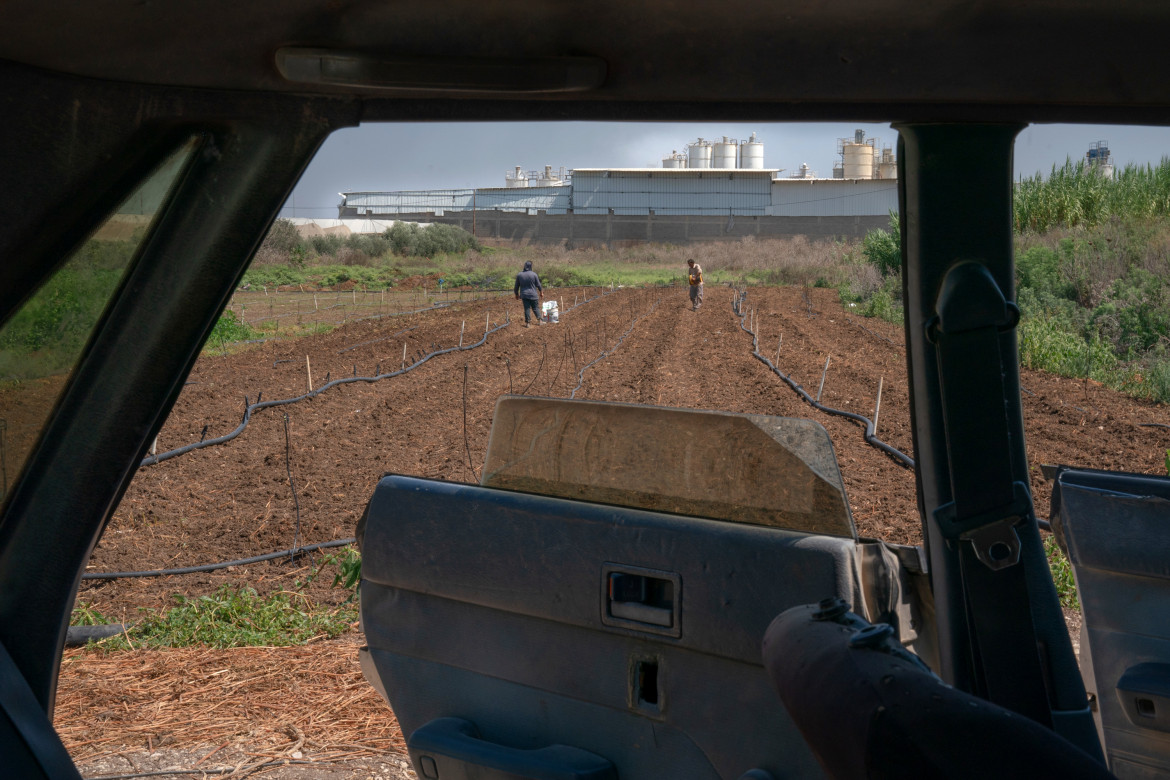Reportage
A ‘Little Gaza’ in the West Bank shows the occupation’s toxic effect on workers
Inside the ‘Sprouts of Peace’ factories, the workers are almost all Palestinians. The Palestinian workers have fewer rights and are paid significantly lower wages than their Israeli counterparts.

It's 3 p.m. and the air smells of bleach, drying the throat and burning the nostrils. Under the blazing sun, two men are walking with buckets in their hands across a field of dry ploughed soil, spreading seeds from the buckets. Behind them, bordering the land, stands a high wall protecting a chemical factory that is spraying its white fumes into the air, sending them wafting across the landscape.
On the other side of the wall, Abed, 38, works in a pesticide factory. He has almost finished his shift and is about to leave through a small door, all rusted, set between tall blocks of reinforced concrete and barbed wire, built up against a dilapidated building on top of which one can glimpse the military camouflage sheeting used by Israeli snipers.
The low, narrow passageway opens a few minutes after 4 p.m. Abed lowers his head to avoid bumping into the ceiling and walks out into the street. He’s wearing cargo pants and a blue shirt, and holding a plastic bag with lunch leftovers. He walks with his head down toward the bus stop.
Before and after he leaves, other workers are coming and going for the shift change, supervised by three private Israeli guards armed with automatic rifles. After the morning shift, Abed boards a minibus bound for his home in Tulkarem. His hair is graying from the dust, he is a laborer, and he knows he will soon be fired.
Starting in the ‘80s, a number of factories were relocated from Israel to the West Bank, specializing in recycling waste, producing nylon, plastics, water filters, fertilizer and pesticides. Over time, the Israeli government has been providing tax incentives to Israeli companies with a business that produces high rates of pollution so they would relocate to the Palestinian occupied territories.
In Tulkarem, a city in the northwest of the West Bank, nicknamed Little Gaza – a resilient city with two refugee camps, Tulkarem and Nur Shams, being subjected to prolonged and bloody Israeli raids – a highly polluting industrial hub was built, on land confiscated from Palestinian farmers, consisting of 12 factories and called Nitzanei Shalom (“Sprouts of Peace”).
Inside these factories, the workers are almost all Palestinians. Their labor contracts, which they sign but do not have copies of, are subject to outdated Jordanian labor laws dating back to the time of Amman's protectorate over the region and offer them minimal protections. They do not guarantee pensions, sick leave – they receive a day’s pay for every three days of certified illness – or sufficient vacation days: only six days a year. Palestinian workers have fewer rights and are paid significantly lower wages than their Israeli counterparts.
In the city’s refugee camps, an Israeli raid is under way, most of the stores are closed, and no people can be seen on the streets. On an anonymous street in the center, next to a dark shack where a man is selling the last of the day's falafel, a massive iron gate leads into a small basement hallway that takes you inside the headquarters of the Tulkarem Workers' Syndicate, which has been declared a terrorist organization by Israel following the attacks on Oct. 7, 2023. In one room are seated workers drinking tea; some have been laid off, others have recently finished their shifts. Abed is sitting and chainsmoking, one cigarette after another.
The atmosphere is that of resignation. After Oct. 7, the Natzanei Shalom area was declared a military zone, the factories stopped production for a month without paying wages, and when they started working again, the working hours and days decreased. All workers from the city's refugee camps have been fired on orders from the Shabak – the Israeli intelligence service in charge of internal affairs – which has instituted an “age regulation” preventing workers under 30, single men and those without children from working due to security concerns.
A man pours everyone some cardamom coffee. Abed tells us he tried once again to get a copy of his employment contract, but was refused. He complains about a new Israeli manager who goes around armed among the workers and verbally abuses them all the time at the slightest mistake. Layoffs were recently announced in his department, and he is on the list. There is no option to refuse.
The air is thick with smoke. For a while, no one talks. The photos on the walls depict past struggles, with workers striking outside factories with guns pointed at them. Now the union no longer has any power.
Abed would be fired shortly. He would never receive a copy of his contract, and would be forced to sign a paper saying he was resigning voluntarily.
Originally published at https://ilmanifesto.it/i-veleni-delloccupazione-a-tulkarem-la-piccola-gaza on 2024-10-20
